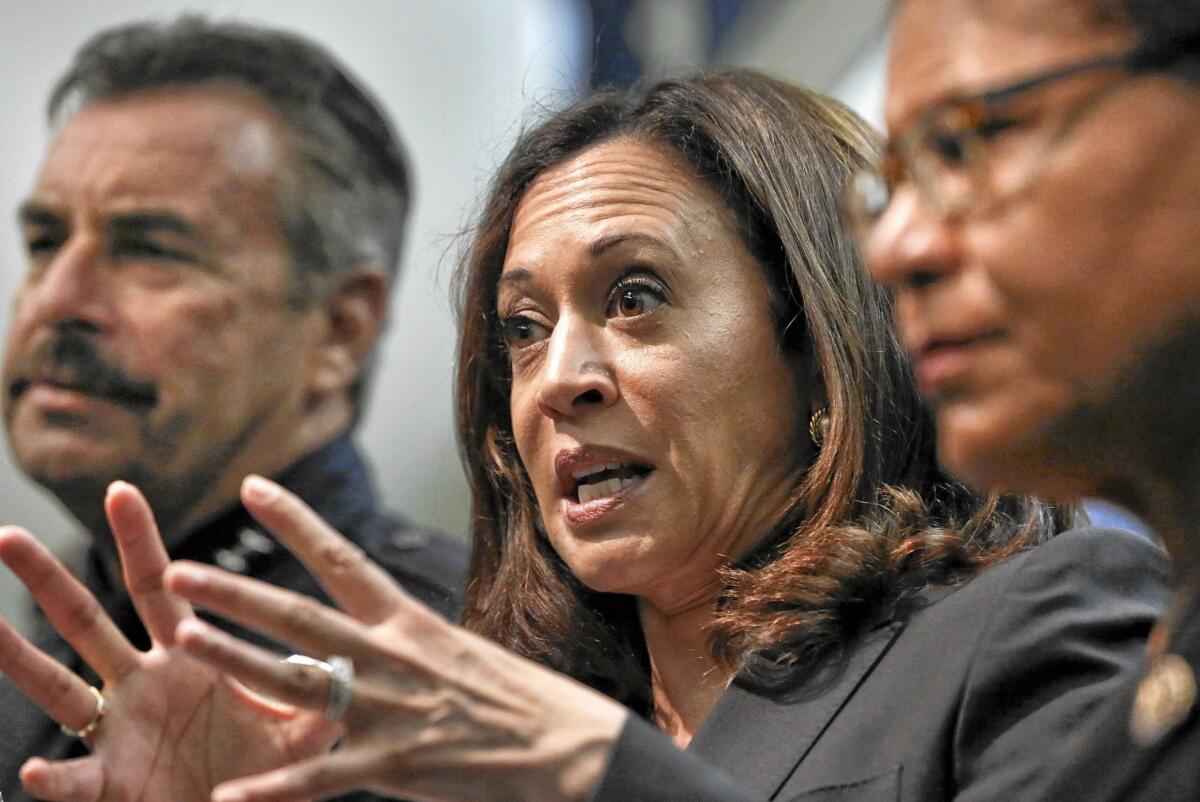Scrooge-like charities ruin more than Christmas for everyone

- Share via
The holiday season is when we tend to get all soft and mushy — and the charity scammers pounce and feed.
Not all charities are scams, of course. Some are just inefficient and wasteful.
Many are angels and deliver what they promise. But to identify them, you really should do some homework on the Web. And most people don’t bother.
They’re rushing to buy Christmas gifts — and racing the calendar to write charity checks before New Year’s so the donations can be deducted on the next tax return.
Most donors just wing it: $35 to one organization, $50 to another. The cause sounds good. The outfit seems familiar. But too many are predators.
That’s not just my jaded view. It’s also the opinion of state Atty. Gen. Kamala D. Harris and every previous California attorney general, Democrat or Republican.
“In 2014, Americans gave more than $350 billion to charities and nonprofit organizations,” a Harris news release said Monday. “This year, many Californians will look to help the less fortunate or support a favorite cause by donating to a charity. Unfortunately, with so much money in play, scammers will continue to look for ways to prey on people’s generosity.”
The attorney general has a unit that investigates charities and prepares long, detailed Web reports. The latest can be found on the attorney general’s website (www.ag.ca.gov). Good luck. The report can be complicated, and it’s 338 pages.
“Do your research, even though everyone seems to be in a big rush just to donate,” advises the unit leader, Senior Assistant Atty. Gen. Tania Ibanez. “There are some really good charities out there with good programs worthy of a donation. But unfortunately there also are some bad apples that aren’t deserving.”
One problem: Many charities hire commercial fundraisers that keep a huge chunk of the donations. On average, the fundraisers grab roughly half. Last year, according to the attorney general, Californians donated nearly $688 million through fundraisers that transferred just 54% to charities.
Thrift stores are much worse. They brought in $125 million — from donated used clothing, for example — but charities got a mere 9.5%.
Vehicle donations grossed $23.5 million, but after salaries, fees and selling costs, only 35% went to the charities.
On Tuesday, Harris filed civil lawsuits seeking to close down two Southern California charities she accused of skimming millions from the sale of donated cars. She and local district attorneys targeted Cars 4 Causes and People’s Choice Charities.
The investigation was triggered by Times columnist Steve Lopez, who caught Cars 4 Causes being really smelly. Harris alleges that only 13% of the money from its car sales went to charities. Even so, that was more than the 3% that People’s Choice turned over.
Any charity with “cancer” in its title attracts donations. In May, Harris and other attorneys general across the country lowered the boom on four: Cancer Fund of America, Children’s Cancer Fund of America, Cancer Support Services and the Breast Cancer Society.
That quartet — all run by the same family — allegedly “scammed more than $187 million” from Americans, Harris said. “The overwhelming majority of contributions benefited only the perpetrators, their families, friends and professional fundraisers, who often received 85% or more of every donation.”
Donors were told their money “would be used to provide pain medication to children suffering from cancer, transport cancer patients to chemotherapy appointments and/or pay for hospice care,” the attorneys general said in a prepared statement. “These, however, were lies.”
Harris’ office says two of the charities have agreed to close their doors and pay multimillion-dollar judgments.
How about charities that don’t rely on commercial fundraisers? Are they more solid? Plenty of those aren’t so hot either, I’m told.
Public safety charities are among the worst. Plowing through the attorney general’s report, I found that $229,000 was donated in 2014 to the Assn. for Firefighters and Paramedics in Santa Ana, for example, but only 11% went to the charity. California Firefighters in Sacramento raised $465,000, but only 20% went to its charity.
On the other hand, the Boys and Girls Clubs of Greater Oxnard and Port Hueneme realized 92% of the $213,405 raised for them. The American Society for the Prevention of Cruelty to Animals garnered 77% of its roughly $2 million in donations. And Breast Cancer Research Foundation of New York netted 100% of the $3.6 million it attracted.
One gripe of mine is that these groups — whether legit or scam — are never satisfied. They clog my mailbox all year long asking for more. Give in December and get pestered every month.
Some send nickels or dimes and ask them to be returned. I put the coins in my pocket and toss the envelope. If they can afford to mail money to millions, they don’t need my dough.
Turns out I’ve been doing exactly the wrong thing, mailing small contributions of $40 or $75 to many charities. That barely pays for the solicitation. So they sell my address and personal information to other outfits.
Better to contribute $200 or $300 to a few local charities I know something about.
“Everyone should think of their donation as an investment and look for the best return,” says Ibanez, the charity chief.
Or maybe just invest in your own pleasure. Bah, humbug.
Twitter: @LATimesSkelton
More to Read
Sign up for Essential California
The most important California stories and recommendations in your inbox every morning.
You may occasionally receive promotional content from the Los Angeles Times.











